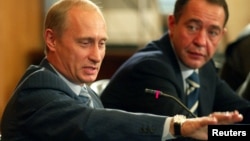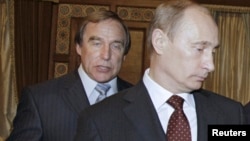Close associates of Russian President Vladimir Putin figure prominently in the Panama Papers, the leaked financial documents that shocked the world this week, but the revelations are drawing little more than a shrug in official Moscow.
The Russian public appears to accept that those in power amass wealth. And moreover, Russian commentators say that nothing in the Panama Papers directly links Putin with any criminal act.
Alexei Navalny, the well-known Russian anti-corruption campaigner and opposition figure, does not agree. He told VOA in an interview that he can envision very serious consequences arising from the Panama Papers disclosures.
The Panama Papers - more than 11 million documents and a huge volume of associated data - reveal details about offshore business and secret financial arrangements involving a worldwide array of political figures, celebrities and public figures. A consortium of international journalists has been publishing details from the documents, all of which came from Panamanian law firm Mossack Fonseca that says it was the victim of computer hackers.
The leaked Panama Papers have made headlines worldwide, and the political consequences are just beginning.
Iceland’s Prime Minister Sigmundur David Gunnlaugsson resigned this week after it was disclosed that he and his wife own a corporation in the British Virgin Islands. The foreign company, which Gunnlaugsson avoided mentioning in financial disclosure reports, holds $4 million in bonds issued by three Icelandic banks that collapsed but were bailed out by Gunlaugsson’s government.
Navalny says the Panama Papers revelations are one of the most significant news stories in many years and he has "no doubt that it will leave a rather large mark on history."
The significance for Russians, Navalny told VOA in Moscow, is "not simply for understanding that Putin is corrupt – we already knew that – but for understanding the mechanism for how they accumulate and transfer the money, and to where." The Panama Papers indicated that a close friend of Putin's, a cellist, owned foreign shell companies that received $2 billion from state corporations and other sources in Russia.
Navalny says he has no doubt about the reliability of the documents leaked in Panama, and expresses hope the information eventually will serve as "legal evidence" leading to corruption charges against "Putin and his inner circle." However, he also said financial scandals "cannot have a serious impact on the general [Russian] population ... [and that they] also have absolutely no political consequences."
Navalny, a 39-year-old lawyer and political activist who has become one of the most prominent figures in the Russian opposition to Putin, said his country "has reached a stage of authoritarianism" where no political consequences can be expected to arise from a scandal over secret offshore companies.
In another case not directly related to the Panama Papers, Navalny said he is now convinced that a Russian multimillionaire found dead in the U.S. capital under mysterious circumstances was "one of the organizers of a corruption scheme in which Putin himself was personally complicit." He was referring to former Russian press minister and advertising mogul Mikhail Lesin, who was found dead with blunt-force injuries in a Washington hotel room in November of last year.
Navalny said he had no "proof" or definitive evidence, but indicated that Lesin may have died because, "as they say in detective stories, he knew too much.”
Navalny had many specific comments to offer on the Panama Papers in general, and about Russian companies and individuals in particular. Here is a transcript of the interview:
VOA: How do you assess the scale of the Panama Papers? Can the information be trusted?
Navalny: I regard this investigation, of course, as highly professional. It may be one of the most significant in modern journalism worldwide. I have no doubt that it will leave a rather large mark on history and most likely will enter the textbooks. I have no reason to doubt the veracity of the information. One could believe that this whole “leak,” as the Kremlin calls it, was intended to discredit [Russia's leaders], were it not for the fact that the whole Russian part of the papers is only 5 percent of the total batch, and that it involved figures who are much more significant than Vladimir Putin – [British Prime Minister] David Cameron and many others. ... I have no doubts about [the investigation’s] reliability.
(David Cameron’s late father, Ian Cameron, was listed as a client of Mossack Fonseca. A spokesman in London said Wednesday that neither David Cameron, nor his wife or their children benefit from offshore funds.)
This investigation is certainly very important, not simply for understanding that Putin is corrupt – we already knew that – but for understanding the mechanism of how they accumulate and transfer the money, and to where. From this point of view, the figure of [Sergei] Roldugin (a cellist and close Putin friend who is listed as controlling offshore companies that received $2 billion from Russia), and all the schemes by which state corporations pumped up Roldugin’s wallet, are important. Perhaps it will - sooner or later, I hope – serve as legal evidence in the process of charging Putin and his inner circle with corruption.
Q: But will this information have any impact on Russian society?
A: Russia has reached a stage of authoritarianism where this investigation cannot have political consequences domestically.... The elites are uneasy. The elites are worried. The corrupt Putin elite realizes that there are no safe havens (abroad). But this cannot have a serious impact on the general population, because Russia is no longer the same country it was even in 2009. And, in this sense, it is absolutely in the same ranks as Azerbaijan [and] Kazakhstan, which also figure in these papers and where this will also have absolutely no political consequences.
Q: Russia participates in several organizations involved in the fight against money laundering — for example, the FATF (Financial Action Task Force on Money Laundering) and GRECO (the Group of States against Corruption). Do you think these organizations can ask Russia about the Panama Papers?
A: I very much hope that Russia and Russian companies will be held accountable for laundering money, for illegal operations. And here, of course, there is the corpus delicti (concrete evidence) of the crime. The actions of companies listed on stock exchanges, such as [the Russian state oil company] Rosneft [and the state-owned bank] Sberbank, they have engaged in insider trading, which under international law must be prosecuted. The [steel and mining] company Severstal, which listed bribes to Roldugin (a Panama Papers document indicates Severstal made a $6 million loan to Roldugin and then immediately forgave it) has big business interests in the United States, and must be called to account under American law for these bribes.
Unfortunately, I fear this will not happen for purely political reasons. In recent years, we have seen practically not a single case in which a Russian company or a Putin friend - even those who clearly violated international prohibitions on money laundering - was held accountable. And even when it comes to the sanctions adopted by the top political leadership of Western countries (in response to Russian actions in Ukraine), we have not seen anything actually seized from anyone.
The one exception was [Putin insider Arkady] Rotenberg, who had a small part of his Italian assets seized. And so, in general, all these villains – [billionaire oil trader and Putin associate Gennady] Timchenko and the Rotenbergs (Arkady and his brother, Boris), and all the others on the sanctions list – none of them has felt a single penny’s worth of tangible material harm or tangible material claims. So we need a political solution. Unfortunately, thus far Western countries have in every possible way refused to implement these options.
Q: But Kremlin spokesman Dmitry Peskov said that offshores are "legal,” and many economists agree, saying they actually see nothing criminal in the published transactions.
A: Offshores as an institution are, of course, legal. Offshores are much more widely used in European countries [than] in the United States. And even the relatively small part of the [Panama Papers] dossier devoted to Russia simply shows that among the more developed countries, the larger their economies are, the more often offshore accounts are used.
Therefore, Britain and Germany are much more involved in all of this. It really is quite a normal business practice... that is used for tax optimization. It is not even in a gray zone; it is absolutely in the white zone. Many countries are actively fighting against this - for example, Germany and the United States in recent years - but it is legal.
However, the legality of the offshore company as an institution does not mean that you can use offshore companies to take bribes. They - I mean, corrupt Russian officials – use … offshore companies to hide money, to launder bribes, to extract bribes, for corrupt payments from Russian state-owned companies. Therefore, the fact that offshore companies are legal in general is not an excuse.
Q: In the published documents, one can find the name of former Russian press minister Mikhail Lesin, who died a mysterious death in Washington last year. Do you think his demise could be related to information he possessed and, perhaps, that he was willing to share?
A: The Panama Papers showed us, and we are now convinced, that Lesin knew a lot. Not just about corruption in the highest echelons of power, but [he] was one of the organizers of a corruption scheme in which Putin himself was personally complicit. And against the backdrop of his death, against the backdrop of the strange things that were happening around him, it's a more than reasonable assumption that, in any contacts he may have had with the federal authorities in the United States, Lesin may have been asked about it. I cannot prove it, but I do not rule out that his mysterious and sudden death could be related to the fact that, as they say in detective stories, he "knew too much.”






